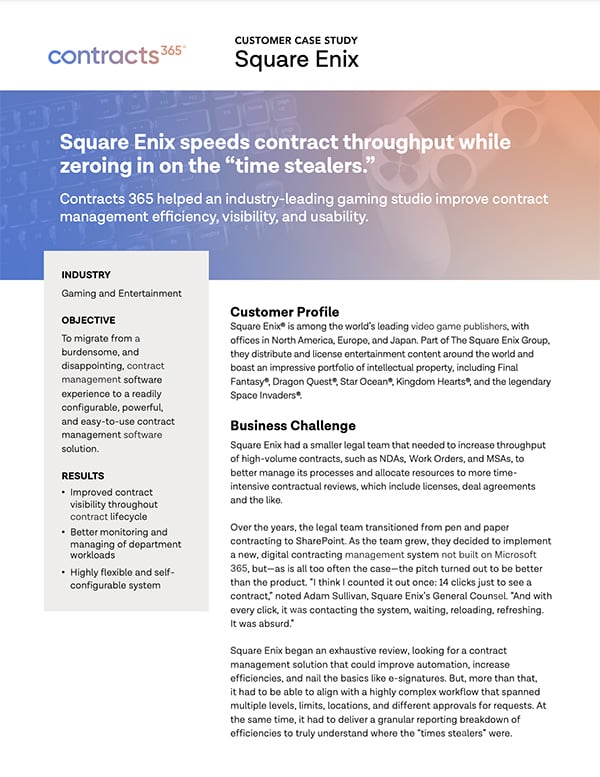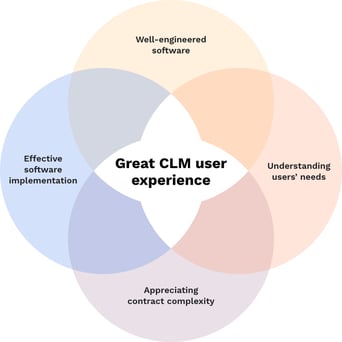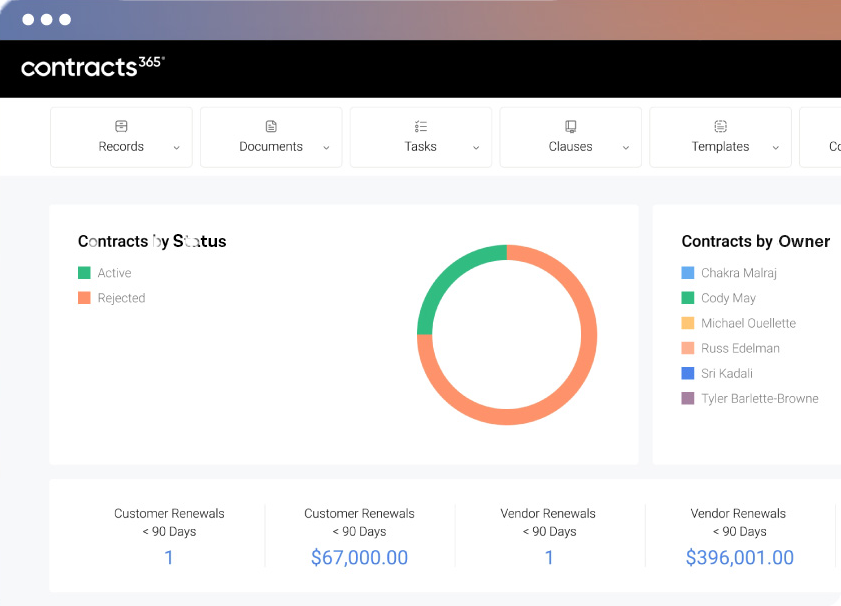Consider These 10 Features When Searching for the Best Contract Management Software for Your Business
Contracts are essential for large and small businesses of all kinds, helping to establish and define relationships with vendors, clients, employees, partners, and others. Effective contract management, from negotiation and creation through execution and beyond, is an important ingredient of a successful business. However, contract lifecycle management (CLM) is a highly complex and time-consuming task, which means meticulous management can also be very costly.
Fortunately, contract management software can streamline this process, making it a critical tool for businesses that want to optimize their contract management processes without breaking their budget. The right contract management system combined with the right vendor can reduce reliance on contract management and legal teams by automating manual tasks and providing secure access to a single source of intelligence on a company’s contract data. It can also minimize the risk of loss due to drafting errors, breach, or regulatory noncompliance.
Many different contract management systems are available today. As a result, it can be challenging to know which will be most beneficial for your business. In this article, we will examine how to find the best contract management software for your organization.
Benefits of Contract Management Software
Contract management software provides several distinct benefits for businesses that use it effectively. The right system can reduce costs, increase efficiency, and minimize risk.
Efficiency
By automating document management tasks, companies can save staff time and keep projects on track. Automated workflows help speed contracts through creation, approval, and signing while notifications and alerts help keep all parties on task. A database of pre-approved contract language provides negotiators the information they need to move ahead, helping to avoid administrative bottlenecks in the creation process. After contracts are completed, employees can be granted permission-based access to the information they need to facilitate appropriate execution, compliance, and enforcement.
Risk Reduction
Contract management software can provide real-time insight into contract obligations and performance, reducing the risk of breach and legal disputes. It can also help ensure contracts are compliant with industry and legal regulations, allowing companies to minimize their risk of fines or lawsuits. This is critical for businesses in highly sensitive industries like healthcare, where data management must conform to strict HIPAA requirements.
Cost Savings
These gains in efficiency and risk reduction can translate into significant cost savings. When a company streamlines its internal processes, optimizes its contract creation process, reliably meets its deliverables, and maintains regulatory compliance, it becomes a leaner operation. It can then channel these saved resources into activities that can help generate revenue and grow the organization.
10 Contract Management Features to Consider When Comparing Contract Management Software
Before choosing a contract management system, it’s important to understand the specific features that would best support the way you do business. When shopping around, consider the value that these 10 features like these would provide for your organization:
1. Contract Repository
Every business has some kind of contract repository, even if it’s just a physical file cabinet or a desktop folder. Contract management software, however, can keep contracts more secure while providing a whole new level of visibility into their details. The software can organize contracts by type, parties involved, or other criteria and provide keyword search capabilities. Some products even integrate AI functionality, allowing users to conduct complex searches to retrieve the precise contract information they need. Permission-based access helps ensure all employees can access the information they need when they need it, helping everyone to stay on top of deliverables, deadlines, renewals, and more.
2. Contract Templates
Templates and pre-approved language make it easy to generate contracts of all kinds. In many cases, the process can be automated. This can allow companies to save on legal costs, whether they have in-house counsel or work with outside attorneys. It also provides a simple, streamlined way to standardize contract language, promoting consistency in terms and compliance.
3. Collaboration & Signatures
Because contracts often must be reviewed, edited, authorized, and signed by a variety of internal and external players, a system that facilitates collaboration can save time and speed the contract creation process. Take note of how the software supports collaboration and e-signature and how easy it is for parties to access these tools. Minimizing the number of apps and sign-ins needed will reduce friction throughout the process.
4. Version Control
Robust contract management software helps companies maintain version control of contracts by tracking and maintaining a complete record of all edits and approvals. Combined with a centralized repository and collaborative tools, this makes it easy for all parties to be certain they’re working with the current iteration of a contract.
5. Notifications & Alerts
Some contract management systems can track the status and progress of individual contracts and alert key employees of important milestones. As a result, employees can better meet deliverables and deadlines and remain aware of expiration and renewal dates, so they can ensure contracts stay in effect when needed and are cancelled or allowed to expire when they’re no longer beneficial. This can help companies maintain smooth operations as well as regulatory compliance.
6. Analytics & Reporting
Contract management software can generate actionable insights into your company’s contracts with analytics and reporting features. Reports can help decision makers understand contract performance, identify risks, and develop a holistic view of the company’s obligations. With this new level of data transparency, companies can begin to optimize their contracting processes to speed contract generation, make better deals, eliminate redundancies, and more.
7. User Friendliness
The more intuitive new software is for employees, the faster they will be able to incorporate it into their everyday activities. If you choose a system that requires extensive training, many steps to accomplish tasks, or is cumbersome to use, it can be challenging to get your team up to speed and begin seeing a significant return on your investment.
8. Software Integrations
When contract management software integrates with technology tools that your business and (others that you contract with) already use, however, everyone can access and implement it with ease. Consider what tools your contract management, legal, sales, procurement, and executive teams currently use, and look for a system that integrates seamlessly with those tools.
9. Security & Accessibility
Robust security is necessary for protecting sensitive contract information. At the same time, ensuring key employees have quick and easy access to contract data when they need it is necessary for optimized operations and consistent compliance. When assessing contract management systems, ensure security features are sufficient to meet applicable data privacy regulations and protect your company’s intellectual property while providing employees easy access to the system when needed.
10. Scalability & Customization
As with all software systems, it’s important to choose one that can easily adapt to your business’ evolving needs. Ensure the software can meet your company’s needs today and into the future and that it allows you to pay for only the functionality that you need.
Download the Square Enix Case Study
Learn More
Finding the Right Contract Management Sofware Vendor
To begin the process of choosing the right contract management software for your business, start by identifying inefficiencies, gaps, and sticking points in your current processes. Use these pain points to set goals and priorities you wish to address with a new contract management system. A contract management vendor may specialize in serving companies of specific sizes or in specific industries, so examine their marketing materials to make sure to choose one that matches your business. Look for case studies and reviews to get a sense of the provider’s reputation for success. Or better yet, read our post about 8 ways to find a contract management software vendor.
After you’ve narrowed the field to just a few candidates, it’s a good idea to request a demo. This allows you to get a sense of not only how the software works with your business but also how the vendor’s team works with yours. You want to make sure the vendor will be there to answer questions, provide technical support, and help ensure smooth implementation. A demo is a great opportunity to ask questions, explore functionality, and get insight from the experts on how their product can help you meet your goals. The intersection of excellent software, a vendor that understands your needs and effective implementation can lead to the best software and experience for your organization.

Contract Management Software for Microsoft 365 Users
Organizations around the world rely on Microsoft 365 and tools like SharePoint, Excel, Outlook, PowerPoint, Word, and Teams as well as the Dynamics 365 platform to conduct daily business. If your company is among them, a contract management systems that works seamlessly with these technologies will speed implementation and help employees quickly use the software competently and effectively, so your company can realize a positive return on its investment sooner. Contracts 365 is comprehensive, end-to-end contract management software designed to integrate seamlessly with Microsoft 365, enhancing productivity and facilitating secure access from anywhere via the Azure Active Directory. Employees can use their existing credentials to gain permission-based access to the contract data they need. Additionally, seamless integration means that the software can incorporate data from emails, calendar events, Word documents, and other sources to create a single source of intelligence on contract data and keep all key players in the loop throughout the contract lifecycle.
To learn more about how to make the most of your Microsoft 365 investment with a seamlessly integrated contract management system, explore important insights in the Contracts 365 blog, download contract ebooks and past webinars, and other free resources or request a demo so we can show you in person.
Subscribe and receive our latest blog articles in your work email.
We value your privacy. By subscribing, you agree to receive our newsletter. We’ll protect your personal data and use your email only for sending useful information. You can unsubscribe anytime. For details on data handling, please see our privacy policy.
Ready to Learn More?
Optimize your team’s contract lifecycle management with Contracts 365®
